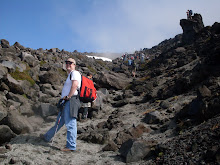Habakkuk 3
I just finished reading God: A Biography by Jack Miles. In this book, he takes the book order of the Tanakh (The books of the Old testament, but ordered differently) and analyzes the character development of God. The ordering of the Tanakh is roughly based on the order that the books were originally written. So Torah (the first five books) were written much earlier than Chronicles, which are the last two books in the Tanakh.
Interestingly, God has a very large presence in Genesis and Exodus, performing all sorts of miracles, like flooding the whole earth, the ten plagues, and splitting the Red Sea. However, by the time you get to Esther, God is not mentioned at all and it is the actions of the Jews, mainly Esther and Mordecai, that save them from annihilation. So what do we make of this transition. Did God stop performing miracles and wonders? Why? Did he lose interest? Did he decide that these large miracles and wonders don't work? Or maybe these stories became exaggerated over time and they never happened?
And this is where Habakkuk comes in. Habakkuk is roughly in the middle of the transition from activity to no activity. He has heard all the stories of how God intervened in the past and he sees the chaos of his own time.
He has read or heard all these stories about God and he is praying that God intervene in his time. He talks about the splitting of the Red Sea, the destruction of Egypt and Midian, and the Sun standing still. But even though God, for a reason unknown to him, is choosing not to intervene on behalf of Israel, he still says,
Like Habakkuk, I know God exists and He cares and I will continue to worship Him. Even though He chooses not to act as He did in the past, even if those stories may have been exaggerated, I will continue to worship him. This is not some irrational stance, because like Habakkuk, I know that God does give me strength.
Interestingly, God has a very large presence in Genesis and Exodus, performing all sorts of miracles, like flooding the whole earth, the ten plagues, and splitting the Red Sea. However, by the time you get to Esther, God is not mentioned at all and it is the actions of the Jews, mainly Esther and Mordecai, that save them from annihilation. So what do we make of this transition. Did God stop performing miracles and wonders? Why? Did he lose interest? Did he decide that these large miracles and wonders don't work? Or maybe these stories became exaggerated over time and they never happened?
And this is where Habakkuk comes in. Habakkuk is roughly in the middle of the transition from activity to no activity. He has heard all the stories of how God intervened in the past and he sees the chaos of his own time.
O Lord, I have heard of your renown,
and I stand in awe, O Lord, of your work.
In our own time revive it;
In our own time make it known;
in wrath may you remember mercy
--Habakkuk 3:2 (NRSV)
He has read or heard all these stories about God and he is praying that God intervene in his time. He talks about the splitting of the Red Sea, the destruction of Egypt and Midian, and the Sun standing still. But even though God, for a reason unknown to him, is choosing not to intervene on behalf of Israel, he still says,
yet I will rejoice in the Lord;
I will exult in the God of my salvation.
God, the Lord, is my strength;
He makes my feet like the feet of a deer,
and makes me tread upon the heights.
--Habakkuk 3:18-19 (NRSV)
Like Habakkuk, I know God exists and He cares and I will continue to worship Him. Even though He chooses not to act as He did in the past, even if those stories may have been exaggerated, I will continue to worship him. This is not some irrational stance, because like Habakkuk, I know that God does give me strength.


<< Home